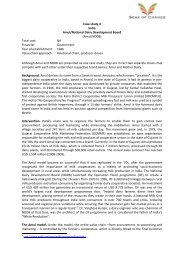Collection of Case Studies 2. - Seas of Change Initiative
Collection of Case Studies 2. - Seas of Change Initiative
Collection of Case Studies 2. - Seas of Change Initiative
You also want an ePaper? Increase the reach of your titles
YUMPU automatically turns print PDFs into web optimized ePapers that Google loves.
sector can be developed and in October 2011, The Zambia National Rice Development Strategy was launchedand is being used to guide the sector.Despite these achievements, challenges in the sector still remain and these mainly deal with the quality <strong>of</strong> ricebeing produced and low productivity issues that continue to make the Zambian rice uncompetitive.Other challenges include:- increasing volumes <strong>of</strong> rice produced to meet local and regional demand- increasing business performance <strong>of</strong> many SMEs involved in the value chain- increasing investment in infrastructure and irrigation systems- increasing access by small holder producers to simple farm implements that reduces intensive labour usageThese challenges <strong>of</strong>fer opportunities for up-scaling support to the rice value chain in Zambia.4. ImpactThere are several things that have changed in the rice sector in Zambia that we would attribute to SNV support.Production volumes <strong>of</strong> paddy rice have improved from the initial 18,000MT to 54, 000MT in 2010. However thisis still below the consumption rate estimated to be at 63, 000MT. The national average productivity hasincreased from 0.9MT to 1.2MT per hectare in 2010, although the majority <strong>of</strong> farmers still get as low as0.7MT/ha. In the areas where SNV works, farmers have been able to achieve as high as 4.5MT/ha, however suchfarmers are few.The productivity changes are largely as a result <strong>of</strong> changes in agronomical practices and yet many farmers stillresist the change due to increased demand on their labour. In terms <strong>of</strong> markets, most market systems in theseven district SNV works have been re-built with many farmers bulking and negotiating the prices at which theysell their produce. At the start <strong>of</strong> our support, many smallholder producers were being taken advantage <strong>of</strong> bytraders and sold their paddy at as low a price as ZMK20, 000 which is equivalent to €3.08 per 50Kg bag <strong>of</strong>paddy. This has since changed with strengthening <strong>of</strong> the producers. The prices they now sale their paddy rangesbetween ZMK60, 000 to 75, 000 which is equivalent to €9.23 to €11.54 per 50kg bag <strong>of</strong> paddy.The ability to bulk rice at smallholder level have reduced the cost <strong>of</strong> accessing the rice on the part <strong>of</strong> theprocessors thus increasing volumes <strong>of</strong> rice being processed and entering high end markets. In 2007 when SNVstarted supporting the rice value chain, there was no Zambian packaged rice on the Zambian retail shelves Todate, a number <strong>of</strong> local processing companies such as DMDC, Frontier milling, New Dawn milling, Yambeeji Riceproducts limited are now supplying such chain stores as Spar, Pick n’ Pay, Melissa and others with local packedrice which has a premium price because <strong>of</strong> its aroma. This has led to big milling companies like National Milling totake notice and also start contracting and buying rice from local smallholder producers thus creating the muchneeded competition in the sector.SNV have also mobilized more than US$500, 000 for various value chain actors in the form <strong>of</strong> trade finance andfunds to support organizational development and strengthening. This has helped to increase the capacity <strong>of</strong> theseactors to increase their performance. For smallholder producers, SNV has supported the development <strong>of</strong> localsavings and credit schemes that have so far been able to mobilize a total <strong>of</strong> US$12, 000 which they areproviding to their 254 members, 112 <strong>of</strong> whom are women.SNV´s work has also influenced the government to develop a national Rice development strategy that establishesthe Zambia Consortium for Accelerated Rice Development (ZCARD) which is the coordinating body dealing withrice development in Zambia. When it is all said and done, SNV capacity development services to the rice valuechain has contributed quite significantly to the rice stakeholders’ collective capabilities <strong>of</strong> committing andengaging, carrying out technical, service delivery and logistical tasks, and managing diversity and coherence,among others.16







